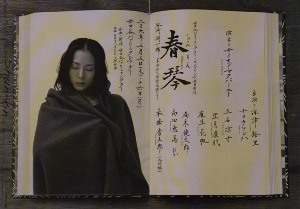Having missed the original production of Shunkin due to my absence (out of Japan, in Korea), as well as their acclaimed previous production A Disappearing Number (out of UK, in Japan), I was overjoyed to see one of their works for the first time in over four years. Just before I came to Japan the production of theirs that I saw was, by chance, The Elephant Vanishes.

Despite the acclaim here last year and the world-wide superb reception of The Elephant Vanishes, Shunkin was given a rather mixed response in the UK: the majority of critics complained that it was an empty work, making cheap puns about something being ‘lost in translation’. Taste aside, the citation of it being two hours long without an interval as a criticism is truly ludicrous, not least because Complicite almost always stage their work like that, but also that countless other contemporary plays and theatre do likewise.
I honestly feel that the critics either really yearned for their free interval drink or could not think of other things to write because they could not penetrate the deliberate contemplative and ambiguous nature of the piece. Nobuko Tanaka has also noted this but I don’t feel, as she seems to suggest, that this is a trait of Japanese theatre (i.e. the critics did not understand that the production, being Japanese, was following a local convention); Shunkin is not a ‘Japanese production’ per se (it simply has a Japanese source material and cast), and though many contemporary Japanese plays do go interval-free, this is mainly on the fringe where there aren’t foyers to mill around in anyway. The commercial theatre and the traditional one are packed with intervals. Regardless, when modern theatre started to do this (reversing a trend that previously had been putting too many intervals into, say, four-act and five-act plays), it was really harking back to Greek conventions, where drama must take place over a short unbroken chronology, since drama’s aim was the release of catharsis in the audience. One brilliant, beautiful example of a modern play achieving the catharsis effect is Blasted by Sarah Kane.
Complicite and McBurney produce work that is both minimalist (often using effective mime, such as here poles held by other actors to imitate fusama) and technologically extravagant (at times highly skilled use of video projection). Their sets are usually simple but epic. They often have fantastic puppets and physical theatre sequences. A favourite scriptual technique is the use of multiple layers of narration, creating interglossia, meta-theatre.
It is easy to see why Eri Fukatsu’s performance won her an award last year; she provides much of the voice-work for the puppet of the eponymous Shunkin, as well as helping to operate it. Further, she plays the final adult incarnation of the character, conveying both vulnerability and menace. However, as with all Complicite work, this is an ensemble piece and there is no ‘star’.
Never have I seen scenes involving a puppet of such eroticism and violence. The play adds layers and layers of motifs: light, shadow, kimono, bird flight, shamisen. As with the best Complicite productions, it explores ideas through narrative, in this case power and control (and of course sado-masochism), investigation and memory. However, in typical Tanizaki fashion it avoids easy conclusion, best summed up by the phrase that re-occurs throughout: “Hakkiri shinai“, it is not clear. See it at all costs.
Shunkin
March 5-16, at Setagaya Public Theatre
